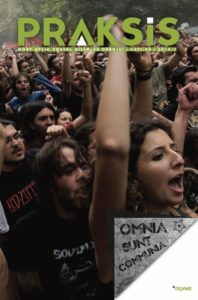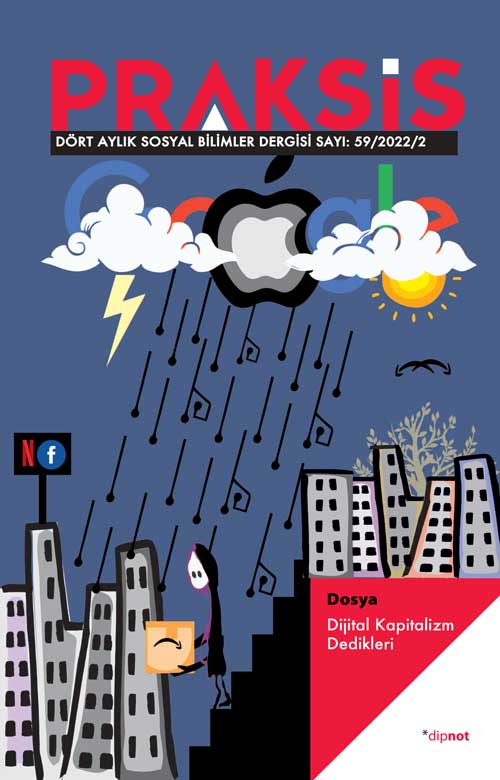Editors: Coşku Çelik, Ali Ekber Doğan, Ali Rıza Güngen, Ali Yalçın Göymen
Enclosures and the Hollowing Out of the Political: The Urban Regime in Turkey
Fırat Genç
This article seeks to explore the ways in which basic concepts of the commons literature (commons, enclosure, commoning) can be operationalized in urban studies, and suggests hypotheses on core characteristics of the spatial regime established in Turkey in the 2000s. In the first part of the  article, I outline three premises to help clarify the analytical limits of the conceptual tool employed: i) Commons denotes a relational category that emerges out of the conflict between acts of enclosure and those of commoning; ii) Enclosures are strategically mobilized power technologies that must be analyzed in the context of certain conjunctures; iii) Enclosures denote one particular form of exploitation and domination, they are top-down interventions that comprise place-making processes with material and imaginary dimensions. In the second part, through a discussion of urban transformation projects and the taming of public spaces, I propose two hypotheses with regard to recent forms of urban enclosures in Turkey: i) Enclosures that can be observed in residential areas of the urban poor deepen the commodification of space while undermining their political capacity; ii) Enclosures that target centrifugal practices in public spaces contribute to the hollowing out of the political by limiting the possibilities for the circulation of counter political horizons and promises. In conclusion I argue that one of the main features of the neoliberal urban regime is the
article, I outline three premises to help clarify the analytical limits of the conceptual tool employed: i) Commons denotes a relational category that emerges out of the conflict between acts of enclosure and those of commoning; ii) Enclosures are strategically mobilized power technologies that must be analyzed in the context of certain conjunctures; iii) Enclosures denote one particular form of exploitation and domination, they are top-down interventions that comprise place-making processes with material and imaginary dimensions. In the second part, through a discussion of urban transformation projects and the taming of public spaces, I propose two hypotheses with regard to recent forms of urban enclosures in Turkey: i) Enclosures that can be observed in residential areas of the urban poor deepen the commodification of space while undermining their political capacity; ii) Enclosures that target centrifugal practices in public spaces contribute to the hollowing out of the political by limiting the possibilities for the circulation of counter political horizons and promises. In conclusion I argue that one of the main features of the neoliberal urban regime is the
articulation of processes of commodification and de-politicization.
Keywords: Commons; enclosure; neoliberal urbanism; de-politicization; commodification.
Time of Commoning and Enclosure: Land Struggles in Göllüce
Begüm Özden Fırat
This article discusses the temporal dimension of the relationship between commoning practices and enclosure processes by focusing on the commoning struggles of the villagers of Göllüce in İzmir against that of the land owner’s acts of enclosure, a struggle that is going on since the 1950s till today. I follow the temporal characteristics of the double movement between acts of enclosure and commoning by focusing on their respective rhythm, timing, tempo and duration on two interrelated temporal levels. The first is the “syncopated” rhythm of those of the irregular, fragmented and messy everyday acts of commoning taking place against different spatial strategies of enclosure. The second is the it “coeval” temporality of those moments in which the ongoing collective action against enclosures, such as the land occupation taken place in Göllüce in 1969, accumulates in concurrency with other local struggles and becomes a movement. I try to understand the land struggle in Göllüce by focusing on these two different temporal relationships between the processes of enclosure and commoning without establishing a hierarchy between them, hoping to discuss the temporal dimension of the double movement between the commoning and the enclosure on the theoretical plane.
Keywords: Land Occupations, 1960’s Turkey, Peasant Movements, Commoning, Land Enclosure, Commons.
The Experience of The Space in the World as a Commons: “Everyone’s but also no one’s”
Adem Yeşilyurt
Dünyada Mekân (literally translated as “The Space in the World”), considered as a coworking space with a solidarist and collective spirit, is also designed as a means/space of organization against precarisation and a place for socialization. The term Coworking Spaces, which is translated into
Turkish as “ortak çalışma mekânları”, refers to a spatial arrangement that allows employees to work independent from each other but at a common time and space, rather than describing working together on a particular job. In this study, the experience of Dünyada Mekân is evaluated as a practice of commonsin the light of the findings of the field research conducted via in-depth interviews and participatory observation, and the problems and challengesfaced until today is associated with the discussions about commons. In this context, the emergence of space, its
history, the problems experienced and its future is reviewed through the literature on commons.
Keywords: Commons, space, coworking, coworking spaces, white-collars.
Organizing the Labour Power as Commons
Dario Azzelini
Translator: Sezer Karagöz
A Critique of the Precariat as a Class Concept
Selin Pelek
The concept of “precariat” has been theorized as a new class with an assertion of re-defining the working class when precarious employment became widespread and the power of organized labor retreated in the neoliberal era. This study examines the ideological roots and political routemap of the precariat and discusses the limits of this concept through a Marxist perspective. Using Turkish Household Labor Force Survey (2016) to analyze precariat’s attributes, this paper argues
that the classical forms of employment still effective in the labor market. The findings indicate the convenience of the evaluation of wage earners in the context of the reserve army of labor rather than constituting a new class.
Keywords: Precariat, precariousness, reserve army of labor, informal employment, part-time work, temporary work.


